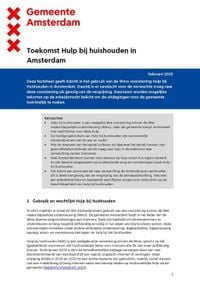As the population of Amsterdam ages, the demand for household assistance is surging, revealing significant challenges within the city's care system. A recent publication from April 2025 highlights the growing need for support under the Wet maatschappelijke ondersteuning (Wmo), particularly among residents aged 65 and older. This demographic shift is not just a statistic; it translates into real-life struggles for many families and individuals seeking help.
Currently, the municipality of Amsterdam is grappling with waiting lists for household assistance, a situation exacerbated by the increasing number of elderly residents. The publication notes that the majority of users of household assistance are indeed those aged 65 and older, many of whom are facing health issues that require professional support.
Factors contributing to the waiting list crisis are multifaceted. The aging population is not just growing; it is also becoming more dependent on external help as fewer older individuals can rely on family, friends, or neighbors for assistance. The pressure on the labor market, particularly in the care sector, adds another layer of complexity. With a shrinking workforce and increasing demand for services, the gap between care needs and available support is widening.
One poignant example comes from the experience of Ilona Dekker, who shared her mother's challenges in securing household help after suffering a stroke. Dekker's 88-year-old mother was advised to apply for assistance through the Wmo following her rehabilitation. Initially assigned just two hours of help every two weeks, the waiting list for suitable organizations stretched over a year, with many providers overwhelmed by demand.
"After almost eleven months on the waiting list, my mother finally received help in May 2023, but the service was unreliable," Dekker recounted. "Care workers often missed appointments, and communication was abysmal. I reached out to the care organization and the municipality but got no response. Instead, I ended up providing care myself, ensuring her home remained clean and orderly. This is the reality for thousands of elderly people in the Netherlands who are left to fend for themselves in a system that fails to deliver on its promises."
Such experiences raise critical questions about the effectiveness and responsiveness of the current care system. Many elderly individuals, like Dekker's mother, find themselves in precarious situations, reliant on a system that often seems unresponsive to their needs. The second Rutte cabinet's decision to close nursing homes has forced more seniors to live independently, which is a viable option only if the promised support is actually provided.
In Genemuiden, a different approach to community support is taking shape through the initiative Genemuiden Zorgt, which has been helping residents since 2019. This organization, a collaboration between Stichting Welzijn De Meente, the Dutch Patients Association, the municipality of Zwartewaterland, and local churches, focuses on providing temporary assistance for small tasks like grocery shopping, transportation, and dog walking.
Harriët Beldman, the coordinator of Genemuiden Zorgt, explained, "We often assist people who have recently moved to Genemuiden or elderly individuals whose families have relocated. Many of our clients have limited social networks, making it challenging to find someone to help with small tasks. Our volunteers provide invaluable support, especially during times when individuals feel isolated or overwhelmed."
Despite the challenges presented by the pandemic, the volunteers of Genemuiden Zorgt continued to serve their community, particularly during lockdowns when many residents were unable to shop for themselves. However, as the visibility of the initiative has waned post-pandemic, the organization is now seeking to increase awareness of its services.
"We want to remind people that we are here to help," Beldman emphasized. Those in need of assistance can reach out directly via phone or email, and the organization is actively looking for new volunteers to join their ranks. "You don’t need to commit to a specific schedule; it really depends on the number of requests we receive. It’s a rewarding experience to help someone in your community," Beldman added.
The contrast between the experiences of Dekker’s mother and those seeking help through Genemuiden Zorgt underscores the varying levels of support available across different municipalities. While Genemuiden’s initiative focuses on immediate, practical assistance, the broader systemic issues in Amsterdam highlight the need for comprehensive reform in how elderly care is organized and delivered.
As the demand for household assistance continues to grow, it becomes increasingly clear that municipalities must be held accountable for the care they promise to provide. The challenges faced by individuals like Dekker’s mother reflect a larger crisis in the elderly care system, one that demands urgent attention and innovative solutions. Without significant changes, the gap between care needs and availability will only continue to widen, leaving many vulnerable individuals without the support they desperately require.
In light of these pressing issues, the question remains: how can local governments ensure that the needs of their aging populations are met in a timely and effective manner? The future of household assistance in Amsterdam—and beyond—depends on a collective effort to prioritize the well-being of all citizens, particularly the most vulnerable among us.







